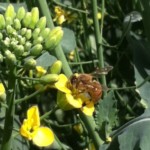 While many policy matters are on idle as we enter the heat of summer and this election year, biodiesel policy issues are not slowing down.
While many policy matters are on idle as we enter the heat of summer and this election year, biodiesel policy issues are not slowing down.
On May 27, the U.S. Environmental Protection Agency (EPA) released the proposed rule for the Renewable Fuel Standard (RFS) volume requirements, including the volume requirements for biomass-based diesel for 2018 and the total advanced biofuels volumes for 2017 and 2018.
 Over the last several thousand years, humans have taken a more active role in the evolution of plants by specifically saving and selecting seed from plants that looked, smelled or tasted particularly interesting. The result was the domestication of plants, making it easier to grow and harvest them and become better, more reliable and nutritious sources of food. This same process continues today, though in a more formalized way, using the science and art of plant breeding.
Over the last several thousand years, humans have taken a more active role in the evolution of plants by specifically saving and selecting seed from plants that looked, smelled or tasted particularly interesting. The result was the domestication of plants, making it easier to grow and harvest them and become better, more reliable and nutritious sources of food. This same process continues today, though in a more formalized way, using the science and art of plant breeding.
 On Jan. 7, the U.S. Departments of Agriculture and Health and Human Services issued the
On Jan. 7, the U.S. Departments of Agriculture and Health and Human Services issued the  On Dec. 18, President Obama signed into law an omnibus appropriations bill and a package of tax provisions, both of which include items of significant interest and impact to farmers and the agricultural industry. Below is a summary of the two laws. The House of Representatives passed the tax package by a vote of 318-108 and the Omnibus Appropriations bill by a vote of 316-113; the Senate approved the package together with a vote of 65-33.
On Dec. 18, President Obama signed into law an omnibus appropriations bill and a package of tax provisions, both of which include items of significant interest and impact to farmers and the agricultural industry. Below is a summary of the two laws. The House of Representatives passed the tax package by a vote of 318-108 and the Omnibus Appropriations bill by a vote of 316-113; the Senate approved the package together with a vote of 65-33. Pretend for a moment it is an early afternoon in the middle of July in Colorado’s San Luis Valley. I’m on my way to visit the honey bee “girls” in the field. They have been staying with us now for over two weeks and have settled into a predictable routine.
Pretend for a moment it is an early afternoon in the middle of July in Colorado’s San Luis Valley. I’m on my way to visit the honey bee “girls” in the field. They have been staying with us now for over two weeks and have settled into a predictable routine.